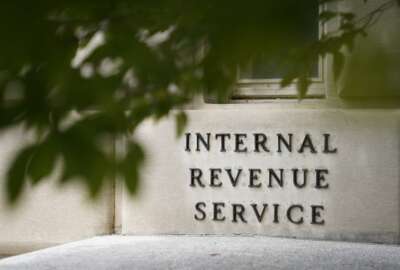IRS mid-level managers adamant about protecting agency from political influence
The IRS is appearing to engage in politically influenced activities. For how audits are supposed to work, and mainly do, Chad Hooper, president of the Professional...
Best listening experience is on Chrome, Firefox or Safari. Subscribe to Federal Drive’s daily audio interviews on Apple Podcasts or PodcastOne.
It happened in the Obama administration and again during the Trump administration. The IRS appearing to engage in politically influenced activities. Earlier it was denying tax exemptions to conservative non-profits. Then it was audits of people not favored by the White House. For how audits are supposed to work, and mainly do, Chad Hooper, the president of the Professional Managers Association, joined the Federal Drive with Tom Temin.
Interview transcript:
Tom Temin And when these things pop up, it’s never good for the IRS, because then the politicians jumped to the conclusion that the other side is therefore using the IRS in a weapons way and so forth. But when it comes to audits, and these were two former FBI people, famously this happened, give us the background on how people are chosen for audits. And you’ve pointed out, I think that these were not necessarily bad choices to be audited, aside from the politics if they were just other types of citizens.
Chad Hooper Sure. Yeah. First it’s important to clarify, there’s two reasons primarily why someone would be chosen for an audit. The first is the one that everyone is thinking of. We call those compliance audits. That’s when somebody makes a deduction that may be spurious or claims a tax credit for which they may not be eligible entirely. Sometimes that’s an accident, the tax codes very complicated, and sometimes it’s intentional. The service has a great number of people who are very skilled at identifying that. We also have a very robust set of computer algorithms that can identify things that just don’t really look right and that causes us take a closer look. That’s not what’s happened here. These were research audits, which is the other kind. There are about, maybe, 5,000 people right now a year who gets selected annually to go through this research audit process. And a research audit is also selected statistically, by the research and analytics function of the wage and investment part of the IRS. It’s just to see if the tax administration function is working properly. It does select returns that are interesting, because if we’re going to see if there’s a there there, it wouldn’t make sense to pick somebody who has like one W-2 and their return is otherwise normal. And so I think we had put out most recent “scandal” came around is that, although it is extremely appropriate for us to be looking into this, because it is a very unusual coincidence that these two people be selected, they did have very interesting returns in the years that were selected. And so when we think about their lives, former Director Comey and assistant director McCabe, they
Tom Temin Of the FBI.
Chad Hooper Exactly, they have books that came out. They were separated from the civil service that year or the year before. So you know, these are people had longtime incomes that were very steady, and then suddenly that stopped. And then they had these enormous, you know, advances. That’s very interesting and would cause the computer to perhaps put you into the selection pile. And I don’t believe that there’s anything nefarious there.
Tom Temin Right. But how do you deal with the fact that because it was both Comey and McCabe, who were caught up in this maelstrom of Trump, and anti-Trump and pro and con and all these politics, it does kind of beg the imagination a little bit that of all the 5,000, those two that year?
Chad Hooper Yeah, it sure does. And I’m not ignorant of that. The concern that we have as an association representing IRS leaders, particularly for the manager of the examination office where this took place, because eventually that comes from right, like a headquarters type system, this selection, but it gets filtered down out to where these taxpayers live. Former Director Comey and Andrew McCabe live in a similar area of Virginia, so that local office handled these and they handled them in a successive fashion. Right? The 2017 audit for Comey was wrapping up when Andrew McCabe’s was selected, so that office had experience of handling a high profile audit when McCabe’s return was selected. I think about that, and I tried to put myself in the shoes of the manager there because when a research audit is given to you get like a list of the taxpayers impacted and the examination function of the IRS does have the ability to remove someone from the sample. And you would do so appropriately for a number of reasons. One of them would be political notoriety to help us avoid a situation like this.
Tom Temin Interesting.
Chad Hooper However, I think it’s important that the Inspector General’s investigating this because failing to withhold that discretion might have been a political act. And I don’t know that.
Tom Temin We’re speaking with Chad Hooper. He’s president of the Professional Managers Association. So therefore, perhaps the algorithm might have spit out those two names in succession, but there is discretion at the local level that someone could have said, you know, maybe this came up totally randomly, but you have two people that are politically controversial, let’s say, and maybe pick somebody else. That can also go back up the line, right?
Chad Hooper Yeah, yeah. It’s a sample of 5,000, sometimes you can just toss them out. If there’s not too many that you’re needing to toss out, it’s okay that the sample is 4,999 people in it.
Tom Temin But the danger there then is in tossing one out, that could be seen as political.
Chad Hooper And that’s exactly our point. When you think about the manager having to make that decision, and remember these names weren’t selected together. We’re talking about it together because that’s how the news broke. But you know, one day, you’re at your desk, and you get your list of names, and the former FBI director is on it in the middle of a political maelstrom. And now you have a choice to make, which is do I do nothing and let it go through, which leaves no human interaction. Statistical analysis was performed. This was what was selected now we will, as professionally as we can, go through this process. Remember, the news that broke wasn’t that anything happened to former director Comey, it was simply that his return was examined. Possibly, and very likely, the return was completely accurate.
Tom Temin Sure.
Chad Hooper Which is usually how a research audit goes. And then a couple of years later, when that was concluded, that office received another list and that had Andrew McCabe on it. And then that manager at that point may have said, “well, it’s been a couple of years since I made that last decision. It probably was good that I did that. I’ll keep my hands out of this one too and I’ll let it go through the process.”
Tom Temin And what are the obstacles to say the head of the IRS, the commissioner, or someone ordering a particular person to be audited? Is it possible for that to work down through the bureaucracy ’til someone says, yes, sir. We’ll look at Joe Schmo here?
Chad Hooper It’s virtually impossible. There are so many systemic alarm bells that go off. IRS workers aren’t even allowed to look at a tax return, or any person, without a business reason and that business reason must be documented. It’s one of the most common ways that an IRS employee is relieved from service. And I say most common because IRS employees aren’t relieved from service very often, but a few hundred or up to 1,000 people a year get jammed up in this. Researching tax returns in an unauthorized a fashion has a very low bar at the IRS in a way that might be surprising to some listeners. Something as simple as going into a system to order for someone that you know, a copy of their W-2s from a prior year that is then mail to their home, so you never even see anything. That is an unauthorized access of tax information. And that gets attached to did you get a phone call from this taxpayer? Did you get an email, a piece of written correspondence? All of that is traceable in the IRS’s internal systems. However much you and I talked about the IRS’s internal systems being antiquated, they are very good at tracing. So because of that, I can imagine a universe in which a commissioner could ask for that. But that requests wouldn’t go very far until somebody got jammed up real quick. And so when you think about going through an audit to completion, how many dozens and sometimes hundreds of people who are involved in that process, there’d be an investigation that was occurring simultaneously by that point. An auditor can make changes to your return, they can only lead you through the investigation. If there were findings, they have to work with an entire facility in another state to implement the changes to your return. There’s the people who send you your audit notice that’s different from your auditor, and things like that. So because the bureaucratic mechanism is so spread out in examination, it’s really hard for us to believe that there would be some sort of like, state sanctioned conspiracy on this. It just, to me, seems like it was a really tough call, because like you pointed out if you allow the audit to continue, this is the news that happens, if this manager chose to forego the audits for political expediency or to keep the integrity of the service and then we later found out that they withheld the audit, we will be having the same conversation in a different way.
Tom Temin And I think the technical word for that is damned if you do and damned if you don’t.
Chad Hooper It sure is, but we couldn’t write that in our press release Tom. But that’s exactly what comes to mind. My heart goes out to the person who had to make that decision. It’s impossible, that I don’t foreclose a reality where someone in that decision, withheld their judgment, withheld their discretion for a political purpose. But if so, would have been their own personal animus not because the commissioner called them.
Tom Temin Chad Hooper is president of the Professional Managers Association, which represents IRS mid-level executives. Thanks so much for joining me.
Chad Hooper Thank you so much, Tom. It was wonderful to see you again.
Copyright © 2025 Federal News Network. All rights reserved. This website is not intended for users located within the European Economic Area.
Tom Temin is host of the Federal Drive and has been providing insight on federal technology and management issues for more than 30 years.
Follow @tteminWFED






